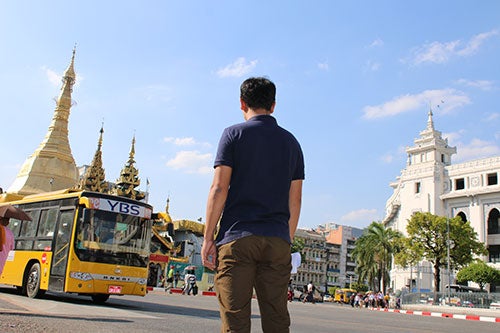News
“Why me?” – Stigma, lack of information leave Myanmar youth in the dark on HIV
- 10 January 2019
News
YANGON, Myanmar – “If I had known about safe sex in my teens, my life would never have turned out this way,” 21-year-old Sithu* told UNFPA. He contracted HIV two years ago.
Sithu had always dreamed of working abroad to support his parents. He enrolled in university, and things looked promising – until he learned he was HIV positive.
“The first thing that came to my mind was to take my own life,” Sithu said. “I could not believe that this was happening to me. Why me?”
He had only been sexually intimate twice in his life, but both times were unprotected. Sithu had not known the risks. He had never received sexuality education, in school or elsewhere.
When he realized that he had genital warts, a common sexually transmitted infection (STI), he went to his local clinic for help. There, he took an HIV test and his world came crashing down.
When Sithu told the boy he had been intimate with about the test result, their relationship ended. Sithu was left feeling betrayed and alone.
“My soul still aches every time I think about what had happened to me two years ago. My last ray of hope was gone, and I was in despair for a long time,” he said.

UNAIDS estimates some 36,000 young people, 10 to 24 years old, are living with HIV in Myanmar. And some youth face an escalated risk of infection, including sex workers, youth who inject drugs, young men who have sex with men, and transgender youth.
Comprehensive sexuality education empowers young people to protect themselves from HIV and other harms. It provides age-appropriate information about how the body works, how to prevent STIs and unplanned pregnancies, and how to take a stand against sexual violence. But comprehensive sexuality education is not a mandatory part of the school curriculum.
Meanwhile, stigmas around HIV and sex can leave young people in the dark about their bodies, health and rights. They may face discrimination when seeking sexual health information or services, for instance.
Sithu has also endured discrimination because of his HIV status, both personally and professionally.
“It was really hard to let go of my dreams. I lost my confidence,” he recalled. “It got worse when I learned about the job rejection at a local bank due to my medical status. I keep thinking that my life wouldn’t have been this way if only I had known to protect myself.”
UNFPA, working with partners, is helping to increase young people’s access to sexual and reproductive health information and services, including HIV-related information and legal assistance.
For example, the UNFPA-supported Myanmar Youth Stars (MYS) organization is providing sexual health education through peer networks and community-based trainings. UNFPA-trained health personnel also learn how to provide stigma-free, youth-friendly health services.
As for Sithu, he is now receiving antiretroviral treatment. He also began receiving health information and support from local organizations, including MYS.
“I am once again able to find my purpose,” he said. “There is a new light in my life.”
Today, he has a new dream.
“I have decided to become a school teacher. What I have been through cannot be reversed, but I want to share my story to save other young people. I want to provide awareness and sex education to as many adolescents and young people as possible.”
*Name has changed to protect privacy